|
|
|
Sort Order |
|
|
|
Items / Page
|
|
|
|
|
|
|
| Srl | Item |
| 1 |
ID:
102535
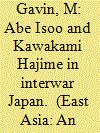

|
|
|
|
|
| Publication |
2011.
|
| Summary/Abstract |
This article explores the views of two eminent professors of economics, Abe Isoo (1865-1949) and Kawakami Hajime (1879-1946), regarding their socialist economic theories for easing poverty in Japan during the interwar years (1918-1939). Prior to this period, Abe believed the cure to capitalism's ills lay in a combination of socialist economic reforms (sangyô demokurashii) and individual spiritual refinement. Kawakami, at that time a bourgeois economist, prioritised the spiritual revolution of the rich over any socialist-type economic reform. Thus, although convinced of the need for a different approach to eradicating poverty, they nevertheless agreed in the need for gradual change rather than radical reform (Gavin East Asia An International Quarterly 24:1, 30). The year 1928 marked a significant turning point both for Japanese social movements and in the lives of Abe and Kawakami. That year heralded Japan's first national election under the new Universal Male Suffrage Law, and saw the police exercise their extended authority as they undertook a nationwide round-up of students and intellectuals suspected of left-wing tendencies (the March 15 Incident). Also in that year, Abe and Kawakami resigned from academic posts to dedicate themselves to alleviating the privations of the working class. Abe, by then well known as the father of Japanese socialism and as a Christian pacifist, became a symbolic figure for Japan's working class parties, although he later came to support the government during WWII. Kawakami, who was forced to resign from his post during the round-up, "washed his hands of bourgeois economics", became a prominent spokesman for Marxism in Japan ([28], xi, pp. 76, 169). This article will reveal that both Abe and Kawakami's social and economic theories changed during the interwar period, so that Abe came to see imperial sovereignty as crucial to socialist economic reform, while Kawakami came to see it as a minion of the capitalists and advocated institutional and political revolution.
|
|
|
|
|
|
|
|
|
|
|
|
|
|
|
|
| 2 |
ID:
180659
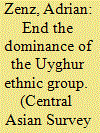

|
|
|
|
|
| Summary/Abstract |
Chinese academics and politicians argue that Xinjiang’s ‘terrorism’ problem can only be solved by ‘optimizing’ its ethnic population structure. High ethnic minority population concentrations are considered a national security threat. ‘Optimizing’ such concentrations requires ‘embedding’ substantial Han populations, whose ‘positive culture’ can mitigate the Uyghur ‘human problem’. Scenarios that do not overburden the region’s ecological carrying capacity entail drastic reductions in ethnic minority natural population growth, potentially decreasing their populations. Population ‘optimization’ discourses and related policies provide a basis to assess Beijing’s ‘intent’ to destroy an ethnic minority population in part through birth prevention per the 1948 United Nations Genocide Convention. The ‘destruction in part’ can be assessed as the difference between projected natural population growth without substantial government interference and reduced growth scenarios in line with population ‘optimization’ requirements. Based on population projections by Chinese researchers, this difference could range between 2.6 and 4.5 million lives by 2040.
|
|
|
|
|
|
|
|
|
|
|
|
|
|
|
|
| 3 |
ID:
026830
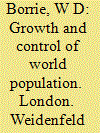

|
|
|
|
|
| Publication |
London, WeidenFeld and Nicolson, 1970.
|
| Description |
x, 340p.
|
|
|
|
|
|
|
|
|
|
|
|
Copies: C:1/I:0,R:0,Q:0
Circulation
| Accession# | Call# | Current Location | Status | Policy | Location |
| 005734 | 363.96/BOR 005734 | Main | On Shelf | General | |
|
|
|
|
| 4 |
ID:
191156
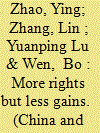

|
|
|
|
|
| Summary/Abstract |
In view of its aging population, China initiated in 2012 a relaxed birth control policy after a three-decades-long implementation of the restrictive one-child policy. This paper examines how China's relaxed birth control policy leads to gender inequality. It specifically focuses on migrant workers because they account for a significant portion of the working group. Using the National Migrant Population Dynamic Monitoring Survey from 2014 to 2016, we found that China's two-child pilot policy reduced female labor force participation by 1.4 percentage points. This negative effect was more pronounced for women with higher educational levels or working in the private sector because employers foresee greater risks of productivity decline. We demonstrated that the gender pay gap increased from RMB956 to RMB1,053 during this same period. Pinpointing these unintended consequences brought about by the relaxation of the one-child policy helps provide a more complete picture of inequality and make sense of persistent relative poverty in Chinese society. To counteract gender discrimination, females are advised to work outside their home jurisdictions and take advantage of positive peer effects.
|
|
|
|
|
|
|
|
|
|
|
|
|
|
|
|
| 5 |
ID:
107860
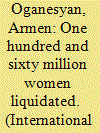

|
|
|
| 6 |
ID:
027044
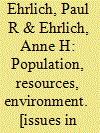

|
|
|
|
|
| Publication |
San Francisco, W.H. Freeman and Company, 1970.
|
| Description |
383p.
|
|
|
|
|
|
|
|
|
|
|
|
Copies: C:1/I:0,R:0,Q:0
Circulation
| Accession# | Call# | Current Location | Status | Policy | Location |
| 005633 | 363.91/EHR 005633 | Main | On Shelf | General | |
|
|
|
|
| 7 |
ID:
087173
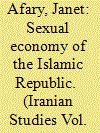

|
|
|
|
|
| Publication |
2009.
|
| Summary/Abstract |
This article examines the gender and sexual policies of the Islamic Republic and their ramifications. It argues that the policies of the Islamist government cannot easily be categorized as "puritanical" or "moralistic." Rather we can argue that various factions within the state actively deployed a new "sexual economy" for the population. Sometimes, the Islamist state privileged patriarchal interpretations of gender norms over more modern ones. At other times, it adopted modern projects such as family planning alongside a discourse that presented them as practices rooted in traditional Islam. In all cases, the state used modern institutions to disseminate and enforce these practices.
|
|
|
|
|
|
|
|
|
|
|
|
|
|
|
|
|
|
|
|
|